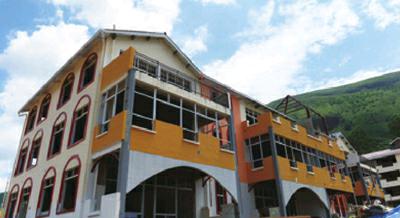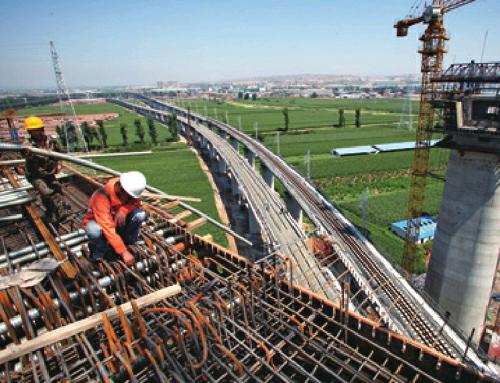New Look
A newly constructed kindergarten in Longtoushan Town of Ludian County in Yunnan Province.
A 6.5-magnitude quake hit Ludian on August 3, 2014. The quake killed 617 people and injured another 3,143. According to government plans, residential reconstruction will be completed by the end of this year and public infrastructure reconstruction will be finished by the end of next year.
Electricity Nationwide
China is planning to bring electricity to the last people in northwest Chinas Qinghai Province that remain off the grid, according to the National Energy Administration (NEA) on August 3.
Around 39,800 people in Qinghai Province will gain access to basic electricity, said Liu Qi, Vice Chief of the NEA, giving no other details such as the date when the project will be completed.
The NEA recently decided to provide electricity to high-altitude areas with harsh natural conditions and a sparse population.
The NEA announced on July 7 that it would spend 92.6 billion yuan($15 billion) this year on upgrades, with 20 billion yuan ($3.2 billion) coming from fiscal funds and the rest financed through bank loans.
Pollution Monitoring
China will build a space-air-ground integrated sensing system to detect and stop pollution, according to the Ministry of Environmental Protection on August 4.
Chinas central authorities decided in July to build a comprehensive ecological environment monitoring system that will have the ability to provide automatic early warning using surveillance sites across the country.
The ministry said it will take back the power of environmental monitoring from local authorities, so that the country will have a unified standard for pollution detection and punishment.
A total of 2.5 billion yuan ($402.8 million) has already been invested in building the system, the ministry said.
So far, there has been more than 2,700 surveillance sites with 60,000 professional staff spread all over the country, covering 338 cities.
Legislation Plan
China has added the formulation of a civil law code to its five-year legislation plan.
On August 3, the Standing Committee of the National Peoples Congress (NPC), the countrys national legislature, published an adjusted legislative plan which includes 34 additional items for lawmakers consideration.
The NPC Standing Committee in 2013 announced an original plan to discuss 68 bills in the following five years and the adjustment on August 5 has taken the total number to 102.
Among the 102 items, 76 are scheduled for discussion within the term of the 12th NPC Standing Committee. Another 26 are set to be drafted and submitted for discussion “when conditions are ready.”
The new items added also include formulation or amendment of laws on elections, corruption, national security, counter-espionage, terrorism and overseas NGOs as well as a law requiring officials to pledge their allegiance to the Constitution when assuming office.
Homes for Disabled
From 2011 to 2014, China renovated the homes of 528,000 households with disabled people to make them more accessible, according to the State Council Information Office on August 3.
The renovations include stair-lifts for wheelchairs, barrier-free modifications to bathrooms and kitchens, among others.
Lyu Shiming, Vice President of the China Disabled Persons Federation(CDPF), noted that better accessibility helps the disabled to remain independent and enjoy the sunshine just like everybody else.
The CDPF recently launched a survey on services provided for the 30 million registered disabled in China and their needs, said Lyu, adding that the result has shown the need for a barrierfree environment.
Volunteers in Tibet
More than 800 volunteers have been sent to southwest Chinas Tibet Autonomous Region this year to support education, medicine and agricultural production in underdeveloped areas.
A total of 820 volunteers, most of whom are university graduates, had been selected from more than 10,000 applicants, since the recruitment was launched in May from 134 universities nationwide, the Tibet regional committee of the Communist Youth League of China announced on August 3.
Their volunteer service usually lasts one to two years. They work in education, medical care, agriculture, poverty alleviation and other areas. The committee arranged a three-day training for the volunteers ahead of their mission to the region in order to help them adapt to the work and life there. The training focused on health and hygiene on the plateau, the history of Tibet and the regions current situation.
China initiated a campaign in 2003 to encourage more university student volunteers to work in the countrys underdeveloped western regions to promote development. To date, 3,702 volunteers have served in Tibet, and 1,035 of them have stayed to work in Tibet after their services.
Rural Tourism
The UN World Tourism Organization has praised China for promoting rural tourism as a way to fight poverty, the organization said on August 4.
According to the organization, the China National Tourism Administration(CNTA) and the State Council Leading Group Office of Poverty Alleviation and Development (LGOP) of China have recently taken the decision to promote“rural tourism as an effective means to fight poverty.”
Moreover, China is launching a plan to lift 17 percent of the countrys impoverished population out of poverty by 2020 through tourism.
The CNTA and Chinas LGOP expect 3 million rural tourism businesses to receive 2 billion annual visitors by 2020, a figure that will allow the lifting of 2 million of Chinas rural population out of poverty every year.
Fishing Season
A fisherman blows the horn as the fishing season starts in Tanmen Port of Qionghai, south Chinas Hainan Province, on August 1. As a two-month-long fishing ban ended on the day, fishermen gathered at the port to celebrate the start of a new fishing season.
Ship for Science
The newly built science ship Xiangyanghong 03 is seen in Wuhan, Hubei Province, on July 31.
Xiangyanghong 03, a vessel costing around 500 million yuan ($80.5 million), was completed by Wuchang Shipbuilding Industry Group Co. Ltd. in Wuhan on that day.
Music Copyright
Chinas copyright regulator said on August 3 that the online music copyright situation has improved since it ordered music providers to remove unlicensed songs in July.
Music streaming services had removed more than 2.2 million unlicensed songs as of July 31, said the National Copyright Administration(NCA).
Internet companies have also improved their efforts in copyright cooperation, said the NCA.
The regulator will help music streaming services find a suitable way to pay royalties and will continue to check for violators.
As part of Sword Net 2015, the anti-piracy campaign aims to improve online copyright management, to protect royalty holders and to restore confidence in the copyright system.
SDR Inclusion
The International Monetary Fund (IMF) said on August 5 that the review on the inclusion of the Chinese currency yuan in its Special Drawing Rights (SDR) basket is well underway and that formal discussions will take place toward the end of the year.
Siddharth Tiwari, Director of the IMFs Strategy, Policy and Review Department, confirmed that the review schedule has not changed despite an IMF staff paper proposing the extension of the current SDR basket by nine months until September 30, 2016.
The current SDR basket, which includes the U.S. dollar, British pound, euro and Japanese yen, is reviewed every five years.
The extension was mentioned as SDR users may need time to adjust to a potential changed basket composition, should the executive board decide to include the yuan, said the official.
“It implies a large likelihood of the yuans SDR inclusion—otherwise the technical preparation would not be necessary,” said Wang Tao, chief economist in China for Swiss financial services provider UBS AG.
Earlier, some foreign and Chinese media outlets mistakenly claimed that the proposed extension means a possible delay in the yuans inclusion in the SDR basket.
Monetary Policy
China will continue a prudent monetary policy, announced the Peoples Bank of China (PBC), the countrys central bank, on August 4.
The PBC said in a statement that it will use a variety of policy tools to fine-tune the market, keep moderate liquidity and achieve reasonable credit and private financing growth.
The statement came amid rising concerns that policymakers may tighten the monetary policy as inflation has shown signs of warming owing to an unexpectedly sharp increase in pork prices over the past few months.
The central bank said that it will continue to improve lending structure, lower financing costs, keep the Chinese currency stable, stabilize financial market expectations and boost the real economy.
Small Commodities, Big Money
A vendor introduces Santa toys to foreign customers in her shop in Yiwu Small Commodity Market in Yiwu, east Chinas Zhejiang Province, in July.
The latest statistics show the combined transaction volume of markets in Yiwu, Chinas largest wholesale marketplace for consumer goods, totaled 60.69 billion yuan ($9.78 billion) in the first half of the year, up 21.5 percent year on year.
Payment Rules
China plans to tighten regulatory controls on the countrys nearly 300 online payment firms.
In accordance with draft rules published by the Peoples Bank of China (PBC) on July 31, the amount an individual can pay online will be capped at 5,000 yuan ($800) per day through third-party payment accounts, unless the customers identity can be verified by a security token and electronic signature.
Members of the public can give their feedback to the rules by August 28.
Industry observers said that rather than making peoples life convenient, the draft rule aims to curb online payment companies from providing services that are otherwise provided by financial institutions.
A follow-up statement of the PBC on August 1 said that customers can use at least five methods of verification to open a so-called “comprehensive account,” which limits annual online or mobile payments to 200,000 yuan($32,220) per person.
PMI Data
Growth at Chinas big manufacturing companies unexpectedly stalled in July as demand from home and abroad weakened, according to a report released jointly by the National Bureau of Statistics (NBS) and the China Federation of Logistics and Purchasing(CFLP) on August 1.
The Purchasing Managers Index(PMI) for the manufacturing sector stood at 50 in July, compared to the previous months 50.2. A reading above 50 indicates expansion, while a reading below 50 represents contraction.
The NBS said that the weaker reading was partly due to the weather, as hot temperatures and heavy rainstorms led some firms to reduce production and carry out maintenance.
“The recent fall in prices of oil and other commodity products also affected related industries,” it added.
Chinas service sector activity further picked up steam in July. The PMI for the non-manufacturing sector expanded to 53.9 in the same month, up from 53.8 for June, according to the NBS and the CFLP.
Non-manufacturing PMI tracks the business activities of service and construction sectors.
The rise has marked the second straight month of expansion, which indicates that non-manufacturing activities are holding steady, said Wei Wu, an analyst at the China Logistics Information Center.
The service sector sub-index stood at 52.8 in July, up from 52.3 in June, demonstrating quicker growth in the service industry. Sectors such as transport, postal services, telecommunications, broadcasting, Internet, software and finance all experienced expansion in July.
The new order sub-index in general slid to 50.1, down from 51.3 in June, indicating slowing growth in market demand. CFLP Vice President Cai Jin attributed the decline to a weak season.
Overhead Project
Workers at a railway construction site in Wanquan County, north Chinas Hebei Province, on August 4. Construction of the railway, which links Zhangjiakou in Hebei and Hohhot in Inner Mongolia Autonomous Region, is expected to be completed in 2018.
Zhangjiakou will join Beijing to host the Winter Olympic Games in 2022.
Bond Sales
The National Development and Reform Commission (NDRC) said on August 5 that it will come out with more initiatives to develop the debt market, particularly those related to boosting funding for infrastructure projects and stabilizing the overall economy.
The NDRC will soon permit two policy banks to fund big-ticket infrastructure projects through bond issues, but it has yet to finalize the details, sources close to the issue told Xinhua News Agency.
According to them, the bonds will be issued by the China Development Bank Corp. and the Agricultural Development Bank of China and they will be purchased by the Postal Savings Bank of China. The Central Government is likely to subsidize 90 percent of the interest on the securities, they said.
“It is the first time that the NDRC has adopted such financial instruments to raise capital for infrastructure projects by working closely with financial institutions,” said Zhang Hanya, President of the Investment Association of China.
Easier Access
China aims to integrate public resource platforms and foster a unified system by the end of June 2017, the State Council, Chinas cabinet, announced on July 31.
By the end of June 2016, local governments will be required to complete the integration of platforms such as those for construction project bidding, trading of land use rights and government procurement, with the aim of forming a regulated, unified and transparent national system a year later, according to a statement released after a State Council executive meeting presided over by Premier Li Keqiang.
The move is intended to improve government efficiency, prevent corruption and allow easier resource access for start-ups and entrepreneurs, the statement said.

